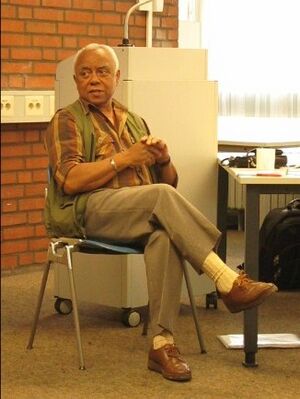Neville Alexander facts for kids
Quick facts for kids
Neville Edward Alexander
|
|
|---|---|

Alexander at the World Conference of African Linguistics in Cologne in September 2009
|
|
| Born | 22 October 1936 Cradock, South Africa
|
| Died | 27 August 2012 (aged 75) |
| Education | Holy Cross School, Cradock, South Africa |
| Alma mater | University of Cape Town BA & MA, PhD (University of Tübingen) |
| Occupation | Political activist, educationalist & academic: lecturer at various institutes and universities |
| Known for | Jailmate of Nelson Mandela and Linguapax winner |
Neville Edward Alexander (born October 22, 1936 – died August 27, 2012) was a brave South African. He believed that everyone in South Africa should be able to speak their own language. He was a political activist who spent ten years in prison on Robben Island with Nelson Mandela. He fought against unfair rules in South Africa.
Early Life and Education
Neville Alexander was born in Cradock, Eastern Cape, South Africa. His father, David James Alexander, was a carpenter. His mother, Dimbiti Bisho Alexander, was a schoolteacher. His grandmother, Bisho Jarsa, came from Ethiopia and was rescued from slavery.
Neville went to Holy Rosary Convent in Cradock. He finished school in 1952. He then studied at the University of Cape Town for six years. He earned degrees in German and History. Later, he went to the University of Tübingen in Germany. There, he earned his PhD in 1961.
Fighting for Fairness
By 1957, Neville Alexander was already very active in politics. He joined student groups that wanted to change things in South Africa. At this time, South Africa had a system called Apartheid. This system separated people by race and treated non-white people unfairly.
Neville joined groups like the African Peoples Democratic Union of Southern Africa (APDUSA). He also helped start a study group called the Yu Chi Chan Club (YCCC) in 1962. This group later became the National Liberation Front (NLF).
In July 1963, Neville and many others from the NLF were arrested. In 1964, he was found guilty of planning to disrupt the government. He was sent to prison on Robben Island and stayed there from 1964 to 1974. This was the same prison where Nelson Mandela was held.
After Prison
After being released from prison, Neville Alexander continued his important work. He focused on language policy in South Africa. He believed that all languages should be respected and used in the country.
He helped create organizations like The Project for the Study of Alternative Education in South Africa (PRAESA). He also advised the government on language policies, especially in education.
Neville was the director of PRAESA from 1992 until 2011. He also worked with the African Academy of Languages. He spent more than twenty years working to protect and support many different languages in South Africa.
In 2008, Neville Alexander received the Linguapax Prize. This award is given to people who make big contributions to language diversity and education. The award recognized his dedication to keeping many languages alive in South Africa.
Later Years and Legacy
Neville Alexander passed away on August 27, 2012, at the age of 75, after a short illness.
His personal writings and documents were given to the University of Cape Town's library. The university has also named a building after him to honor his important work and contributions to South Africa.
 | May Edward Chinn |
 | Rebecca Cole |
 | Alexa Canady |
 | Dorothy Lavinia Brown |

